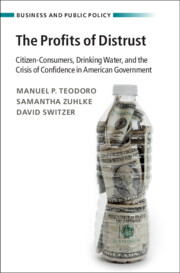 The Profits of Distrust
The Profits of Distrust Book contents
- The Profits of Distrust
- Business and Public Policy
- The Profits of Distrust
- Copyright page
- Dedication
- Epigraph
- Contents
- Figures
- Tables
- Preface
- Acknowledgments
- 1 Basic Services and Trust in Government
- 2 The Profits of Distrust
- 3 (Dis)trust at the Tap
- 4 Hyperopia and Performative Trust
- 5 Speaking Up or Opting Out
- 6 Geographies of Alienation
- 7 When Trust Pays
- 8 Basic Services and Rebuilding Legitimacy
- The Plan
- Book part
- References
- Index
- Other books in the series
8 - Basic Services and Rebuilding Legitimacy
The Water–Trust Cycle, from Virtuous to Vicious and Back Again
Published online by Cambridge University Press: 18 August 2022
- The Profits of Distrust
- Business and Public Policy
- The Profits of Distrust
- Copyright page
- Dedication
- Epigraph
- Contents
- Figures
- Tables
- Preface
- Acknowledgments
- 1 Basic Services and Trust in Government
- 2 The Profits of Distrust
- 3 (Dis)trust at the Tap
- 4 Hyperopia and Performative Trust
- 5 Speaking Up or Opting Out
- 6 Geographies of Alienation
- 7 When Trust Pays
- 8 Basic Services and Rebuilding Legitimacy
- The Plan
- Book part
- References
- Index
- Other books in the series
Summary
Basic services – the mundane but essential necessities of daily life – hold the promise of redeeming and strengthening American democracy. The burgeoning crisis of legitimacy besetting democratic governments across the globe has emerged in large part because many citizens no longer trust authorities to secure their basic needs. Americans’ experiences with and observations of failing basic services shape their behaviors as citizens and consumers, contributing to a cycle of distrust and government failure. Breaking and reversing this vicious cycle begins with sound public administration at every level of government. Government leaders who commit to excellence, openness, and equity in basic services can spark a new, virtuous trust-building cycle. Rigorous evaluation should accompany basic service implementation to ensure excellence and build performative trust. To establish moral trust, the agencies responsible for basic services must treat people respectfully and honestly, lavishly share information, and actively engage with the communities that they serve. Rebuilding democratic governance begins with literally rebuilding the basic infrastructure that sustains life.
Keywords
- Type
- Chapter
- Information
- The Profits of DistrustCitizen-Consumers, Drinking Water, and the Crisis of Confidence in American Government, pp. 191 - 212Publisher: Cambridge University PressPrint publication year: 2022


